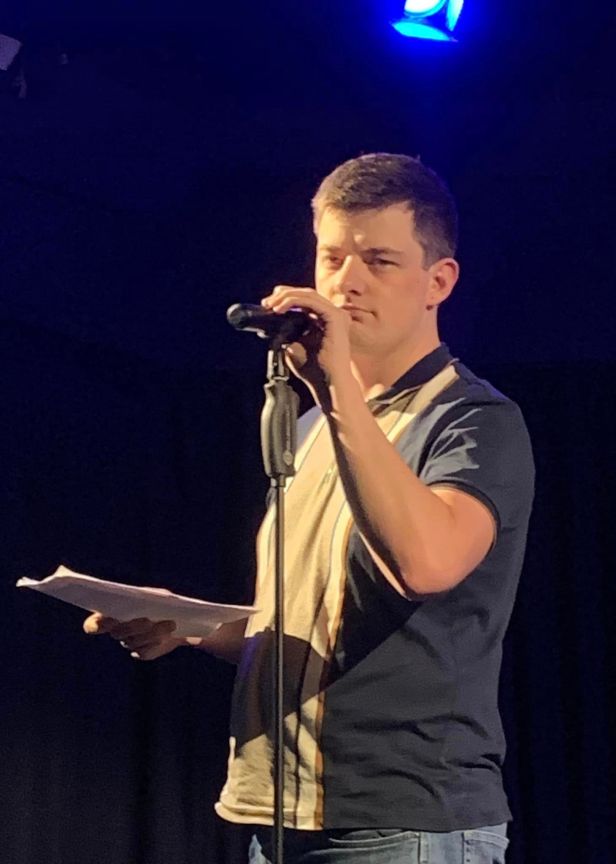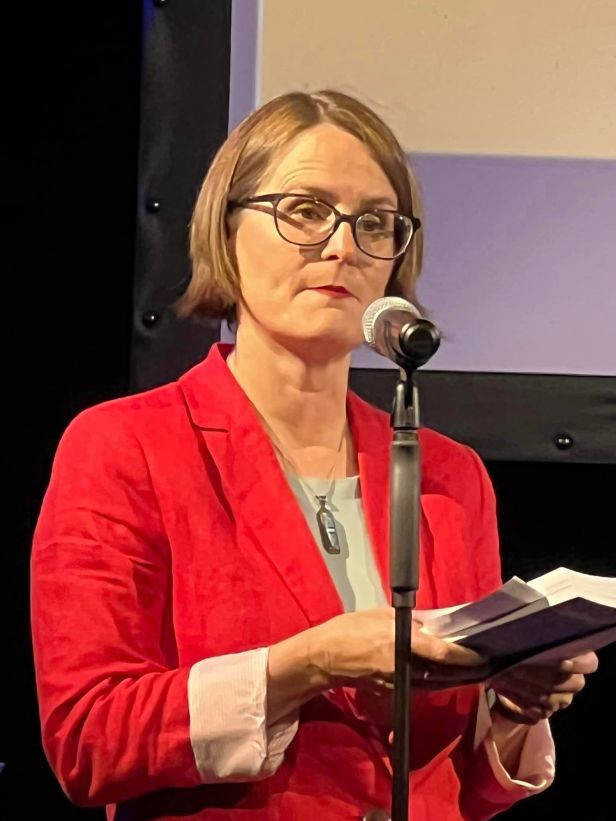When I first thought about pitching an idea for a performance at the Penzance LitFest, I didn’t know what to do. My original idea of a collection of poetry about death was stymied as soon as the LitFest announced that the theme for this year was ‘Arrival’.
My first thought of the Welcome to Cornwall sign, so beloved of social media memes (usually having a pop at tourists) was a welcome for me as I had a number of poems about Cornwall, but not the Cornwall that was so often seen on television. The poems I had written were addressing issues that many from outside Cornwall did not know existed…lack of affordable housing, second homes, over-tourism, deserted villages and childhood poverty. This last issue would play a big part in the eventual presentation.
I had been told of a Radio 4 programme called The Patch, which investigated an amazing story gleaned from a randomly selected postcode. In this case it was TR14 – Camborne. The story was that there were children who lived a few miles from the sea who had never been to see it. Sounds unbelievable, but the programme verified the truth of it. I had written a poem called Sea Fear based on an imagined conversation between a poet (myself) and a young woman high up on Carn Brea, a hill that overlooks Redruth and neighbouring Camborne. The young woman asks the poet if that is the sea she can see, the poet is amazed that, despite living in Redruth all her life, she didn’t know this. The fact that she had never taken her children to the seaside becomes apparent as the conversation moves on.
To give the audience a break from my voice, I wrote the poem as a play for voices (there wasn’t time to make it a play for stage) and two actor friends, Kate Barden and Robert Erskine rehearsed it and performed it. The ‘set’ was further enhanced by two short stories from the Cornwall Writers anthology, Cornwall: Secret and Hidden which were both about deprivation in Camborne. In one case we got the author, Catherine Leyshon, to tell her story and the other, written by Ross James, was read by a young Cornish actor Trevenen Harry.
The evening went well and over sixty seats were taken up at The Acorn Theatre. I had organised the event so that things got progressively hopeful as the evening went on. The second half finished with the happy ending of Sea Fear, Catherine’s humorous short story and me finishing with a hopeful poem about Cornwall’s future. It was remarked upon after the show that an event which highlighted the problems of modern Cornwall had been delivered with a light-hearted touch and much laughter had been heard throughout the evening.
“Welcome to Cornwall – but it’s not the one you might see on TV” was hilarious and yet sensitively pried open the darker side of second homes, the closure of Crofty and living four miles from the sea in Camborne, Pool and Redruth but never having visited or even seen it. It was a privilege to listen to the very talented poets, authors and performers.” – Cornwall Writers.
“The show, Gray Lightfoot’s “Welcome to Cornwall – but it’s not the one you might see on TV”, was both thought provoking and, at times, hilarious.” Kath Morgan – The Writing Retreat
photo credits to Stephen Dodgson, Renate Mathilde – Ernest, John Pestle and David Rowland

GRAY LIGHTFOOT

KATE BARDEN

ROB ERSKINE

‘SEA FEAR’ WITH ROB AND KATE

TREVENEN HARRY READING ROSS JAMES’ ‘UP FROGS’

CATHERINE LEYSHON READING HER OWN STORY ‘THE TRIUMPH OF GOLIATHIA TREMAYNE’


So interesting to read your reflections, Gray. And so sorry not to have been fit enough to be there….. Well done with it. So pleased it was well-received and much appreciated by others.
Developing the ‘arc’ of a dramatic evening is much like composing. Here you say it started dark, and grew lighter. A contrast from much dramaturgy which is the reverse, or plays with your soul throughout, throwing it from one extreme to another.
The Play is a Play. It was on a stage with visible actors etc. No need to write more than what is heard, with perhaps the odd direction, and some writers like to see what the director / company come up with. Or you can be very prescriptive about every move, look, famously ‘pause’ as with Pinter, and hope not to need to unleash wrath at the dress rehearsal and the threat of a court summons!
I used to also achieve about 60 for my Acorn Studio Drama showcases, and grew to like this and continued using the smaller downstairs theatre even when upstairs was offered. The work was either solo, or two or three handers, and I enjoyed the challenges of the smaller space. Easier to be more creative sometimes when confined. No need for mikes, as people learnt to project and engage more with the more intimate audience. Perhaps try it?
Look forward to discussing these thoughts sometime and hearing about your future projects.
Gill
Thank you, Gill. You have given me much food for thought (if you pardon the cliche). Even though the subject matter was quite dark, I was surprised by how many people remarked on how much they laughed (but in a good way). I knew many of the audience and realised I was ‘preaching to the converted’, people who were well aware of the problems. Working in the Acorn, I chat a lot with Richie. He told me that tourists very rarely make use of the Acorn ( less than 10%).
If you wish, I will send you copies of the two short stories that were read. Catherine’s the last one was really quite funny and Ross’ story, though unbearably sad, had a lot of humour in it. Both were really pertinent to Cornwall’s problems.
Got a couple of things coming up – ‘headlining’ at The Yacht and Dhyano Luca Angius (who does a lot of experimental theatre work in St Ives) has given me an hour to do what I want for the September Festival.
Lovely chatting with you
All the best
Gray
(got to go volunteering at The Acorn for Dave Mynne’s Canterbury Tales)
I would love to see Dave’s Canterbury Tales! Very talented company.
You certainly work hard at promotion and it’s great you have events lined up, Gray.
Would be interested to know what you end up planning for the hour in St Ives?
I would always be happy to offer thoughts and suggestions to support the practical production of any group / thematic / collection of short performances.
Keep in touch!
Cheers, Gill